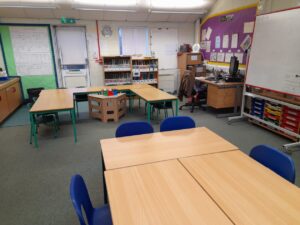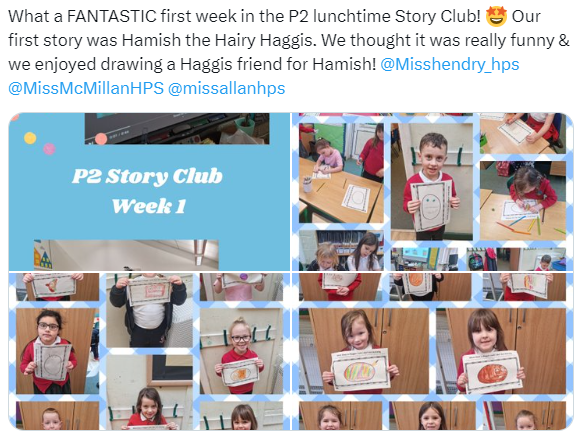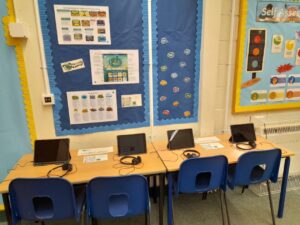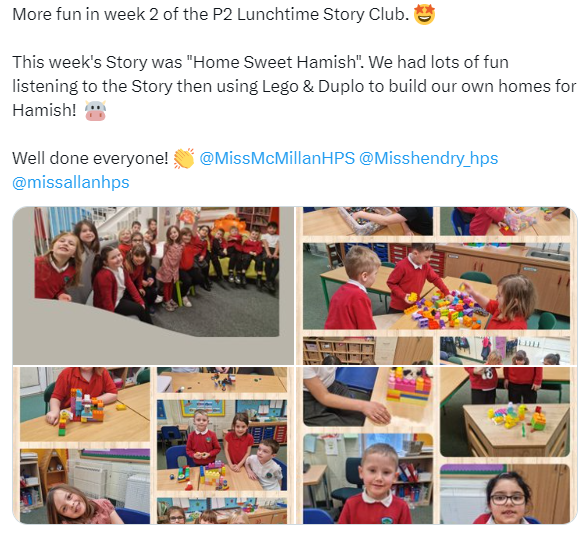Over the past 2 school years, staff at Hallglen PS have developed how they support children with their literacy progress. They have identified a selection of programmes and processes which enable them to tailor interventions to children’s individual needs. Diane Ramage, principal teacher, and Samantha Nash, support for learning teacher have also worked with staff colleagues and children to establish new ways of working. This includes the creation of a new support for learning space and the adoption of a range of literacy materials and activities which their support for learning assistant can use with children.

Which Interventions are being used?
The programmes and interventions being used will be familiar to colleagues, and include:
- Read, Write Inc Phonics (for p 2-5)
- Read Write Inc Fresh Start (for P 6 & 7)
- Reading Recovery Wave 3
- Nessy
- Story Club
- Use of tracking and monitoring data to inform specific intervention plans for children
- Regular dialogue between class teachers, support for learning teacher, support for learning assistant and school leaders
- Timetabled blocks of literacy support – 6-8 weeks
- Liaison with Jude Davies, Support Teacher Specific Learning differences
- Use of the Falkirk Literacy Pathway
How are these being employed?
Sam began to use Read Write Inc Fresh Start last session to help identified groups of children in primary 5, 6 and 7 to raise their reading attainment and build their confidence in reading. Initially this involved 21 pupils but the group gradually dwindled as more and more children “caught up” with their peers and no longer needed specific support. This programme was so successful that less than a third of this original group of children now require support with their reading.
In response to their observation of this impact on the children involved, Diane and Sam planned how to continue to use the Fresh Start programme with children in primary 6 and 7. In order to intervene earlier, Sam also trialled the Read Write Inc Phonics programme to support children in primary 2 – 5.
Both Read Write Inc programmes are helping children to learn the sounds which they need to read successfully. The children benefit from the use of the programme’s flash cards. These support explicit teaching of the links between the visual form of the letter/sound, its memorable and explanatory rhyme and the repetition and consolidation of the sound itself. The pedagogy employed by Sam and colleagues scaffolds the children’s ability to recall their sounds swiftly as they read – gradually enabling them to both de-code and increase their fluency and confidence.

Children progress through the Fresh Start programme at an appropriate pace and the intense, structured approach is re-engaging children with learning to read and reading to learn. Impact on reading for enjoyment is becoming visible also. This is evidenced by children’s voluntary participation in the Story Club initiative which Sam has started to run at lunchtime once a week. This initiative is an intervention designed to support issues with reading skills at the primary 2 stage.
Children choose to opt into Story Club and each session involves her in reading a story to the children then offering an related activity (currently adult initiated). Twenty eight children came to the first session and numbers remain high at this early stage of this initiative. Sam noted the attendance of one child in particular who, following his use of the Phonics programme, is beginning to master reading. This child previously hated and avoided reading so his choosing to attend Story Club evidences a huge change in his attitude to this essential skill.
Diane, Sam and colleagues regularly analyse their tracking data and other intelligence relating to their learners’ reading and literacy progress. They have instigated a 6 week assessment cycle which informs timetable and menu of support changes every 6 – 8 weeks. This regular review of where children are enables more accurate selection of interventions for children and more intense, structured support. In addition school processes enable class teachers to liaise with Sam at any point to explore how best to support their pupils.

Staff at Hallglen PS are also using the Nessy online platform and resources in a number of ways. Primary 6 and 7 pupils at Hallglen access Nessy online learning routinely using their digital devices. Sam noted that this independent, on demand access was not possible for primary 4 and 5 children because they don’t yet have individual devices. She set up 4 iPad word spaces within the Support for Learning classroom and primary 4 and 5 pupils now come regularly to use these independently to support their reading and spelling skill development. Teachers are also making use of individual children’s Nessy spelling targets to support more accurate differentiation of spelling tasks. Staff plan to explore other parts of the Nessy platform to consider further applications which may be valuable for their children.
As part of her To Lead or Not to Lead professional learning, Sam is working with primary 2 teacher colleagues to gather data about the comparative impact of the Read Write Inc Phonics and North Lanarkshire Active Literacy programmes on children’s reading. The outcomes of these studies will inform how these literacy interventions are used to support children’s progress in future.

Review and Next Steps
Diane, Sam and colleagues feel that their support for learning processes and intervention “package” has been transformative for their school and children. They have a “menu” of support which is responsive, pacey and is raising children’s confidence and ability to read. By making use of data, intelligence, professional dialogue, assessment and timetabling in combination with effective pedagogy and programmes, they are raising their children’s attainment in, and enjoyment of reading. They plan to consolidate this focus on reading while integrating development of spelling and writing to extend and enrich their menu of literacy support for their children. Diane, Sam and colleagues are rightly proud of their “package” of support for literacy learning and look forward to continuing its development for the benefit of their children.

